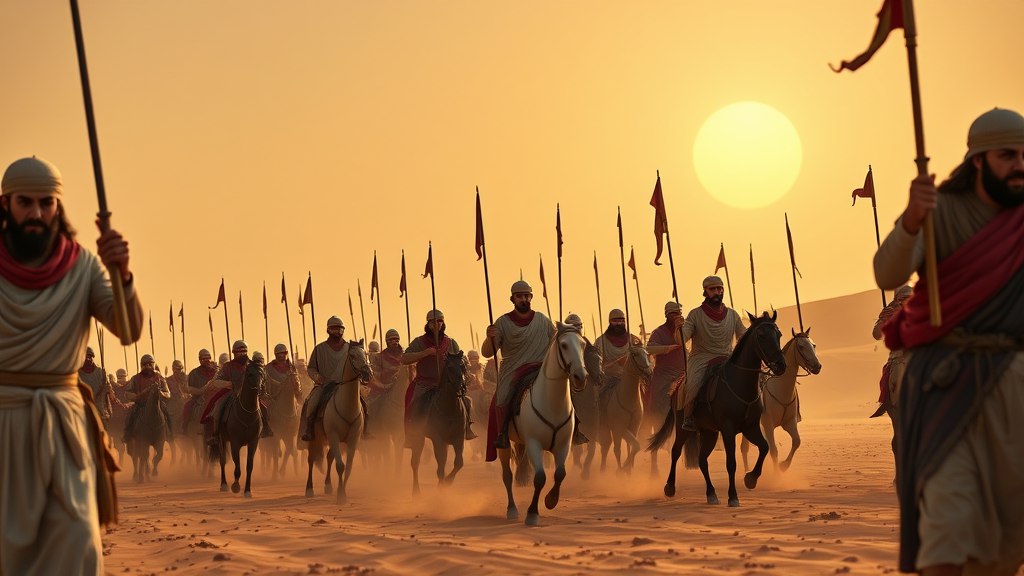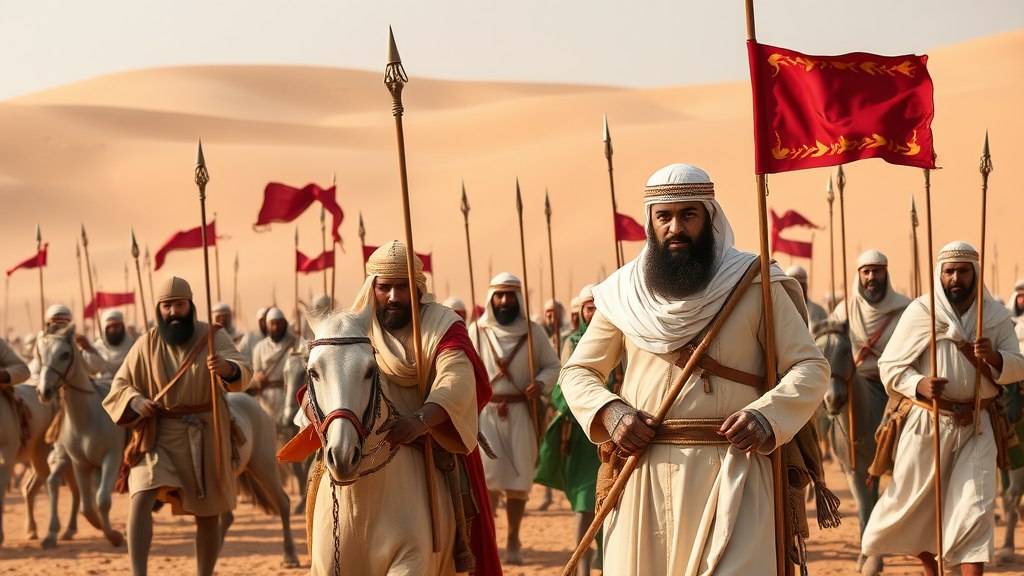In the name of Allah, the Most Gracious, the Most Merciful.
I want to tell you a true story of courage, faith, and ultimately victory—how Allah comes to our aid when He sees all our efforts. Join me as we witness an inspiring tale from the battle between truth and falsehood.
The Prophet and his companions were living well in Medina, but the harassment from the leaders of Quraysh continued, harming the Prophet's trade caravans. Eventually, the Prophet decided to confront them, and the groundwork for the Battle of Badr began.
On the day when Abu Sufyan's trade caravan was heading to Gaza, the Prophet decided to attack their group for revenge against Quraysh. However, that day, Abu Sufyan left earlier and sent a message to Mecca asking for protection for his trade caravan upon his return. The order for war was communicated to the Prophet, and he called upon the Muslims to fight against the disbelievers.

There were some hypocrites among them—those who outwardly accepted Islam but had no faith in their hearts. These hypocrites expressed their opposition, saying, "We have no equipment, and their numbers are greater than ours; we cannot fight them." But Muqdad, one of the Prophet's companions, said, "O Prophet, we are not like the Jews who said to Moses, 'You go and fight with your Lord; we will wait here.' We will stand with you until the end and fight to defend ourselves."
A total of 313 men volunteered for the battle, while they had only forty horses, a few swords, and many of them carried sticks. They did not have adequate military equipment, yet they set out for war.
However, the Quraysh army had a thousand troops with complete military equipment, and they faced each other in an area called Badr, which had many wells. The Prophet sent a message stating that they did not want to start a war and were not seeking conflict. However, the commander of the Quraysh army, Abu Jahl, was a very harsh and tyrannical individual who did not accept the Prophet's message.
Seeing the large number of enemies, the Muslims felt fear, but verses from the Quran were revealed, stating that if you have faith, then for every hundred of you, a thousand of the enemy will be able to be confronted. At the beginning of the battle, they sent three of their strongest and most powerful men into the field, while the Prophet sent his uncle Hamza and Imam Ali into the arena. Those three men were killed by Hamza and Ali, causing fear and panic among the Quraysh army.

The battle began, and the Muslims fought with all their strength and hope. Fourteen Muslims were killed, while seventy from Quraysh were slain, with thirty-five of them killed solely by Imam Ali. This is why Quraysh always held a grudge against Ali.
The Prophet told Ali to go and bring back some soil from a specific place. When Imam Ali brought the soil, the Prophet recited a prayer and threw it towards the enemy army. A cloud of dust rose from the ground and went into the eyes of the Quraysh army, causing confusion and significant casualties among them. The Muslims captured forty of the Quraysh army, and the rest of the Quraysh forces fled in fear. Thus, the Muslims achieved victory in the Battle of Badr with minimal resources.
The Quraysh army returned to Mecca in disgrace, and the people of Mecca were very surprised at how they had been defeated. This defeat increased the influence of Islam and the Muslims, as well as the belief in the God who had aided them in the region.
On the other hand, the Muslims gained a lot of morale from their victory in this battle, and their confidence increased significantly, along with their faith in God's divine assistance. They returned triumphantly to Medina with a great deal of spoils and wealth. When they left, they had only one camel between two of them, but upon their return, each of them brought back two camels and a horse. Meanwhile, the people of Medina, as well as those who had refrained from joining the battle, were astonished and came to apologize to the Prophet.
The Muslims had captured forty prisoners, some of whom had tortured Muslims before the Hijrah. By the order of the Prophet and through Imam Ali, they were executed with swords. However, the remaining prisoners were treated kindly, as per the Prophet's instructions.
They told the others to either pay a ransom to be freed or to teach our children how to read and write, after which they would be set free. Some of them were released for money, while others taught the children and were also freed. A number of them, upon witnessing the kindness and forgiveness of the Prophet, embraced Islam and stayed in Medina.
However, the leaders of Quraysh could not bear this defeat and began planning for revenge and the next battle. Join me in the next video as I tell you about the second battle of the Prophet against the disbelievers.
Dear friends, I am Rana, and I narrate the history of Islam in a simple and story-like manner. For religious consultations, you can contact me via WhatsApp.

دیدگاه خود را بنویسید